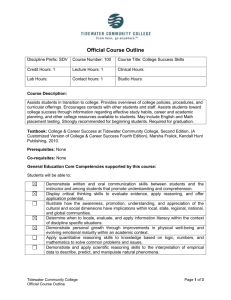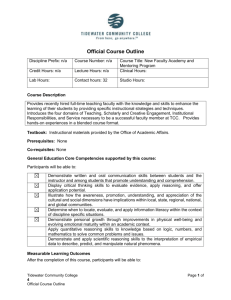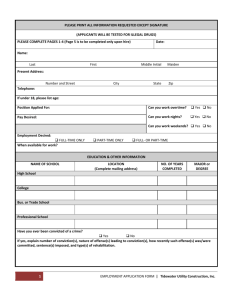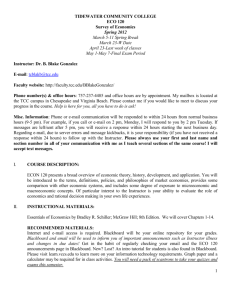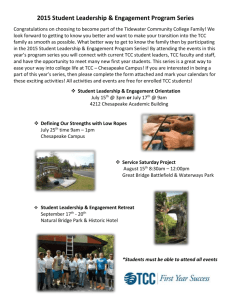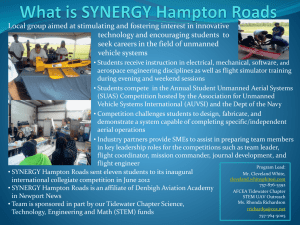Official Course Outline - Tidewater Community College
advertisement
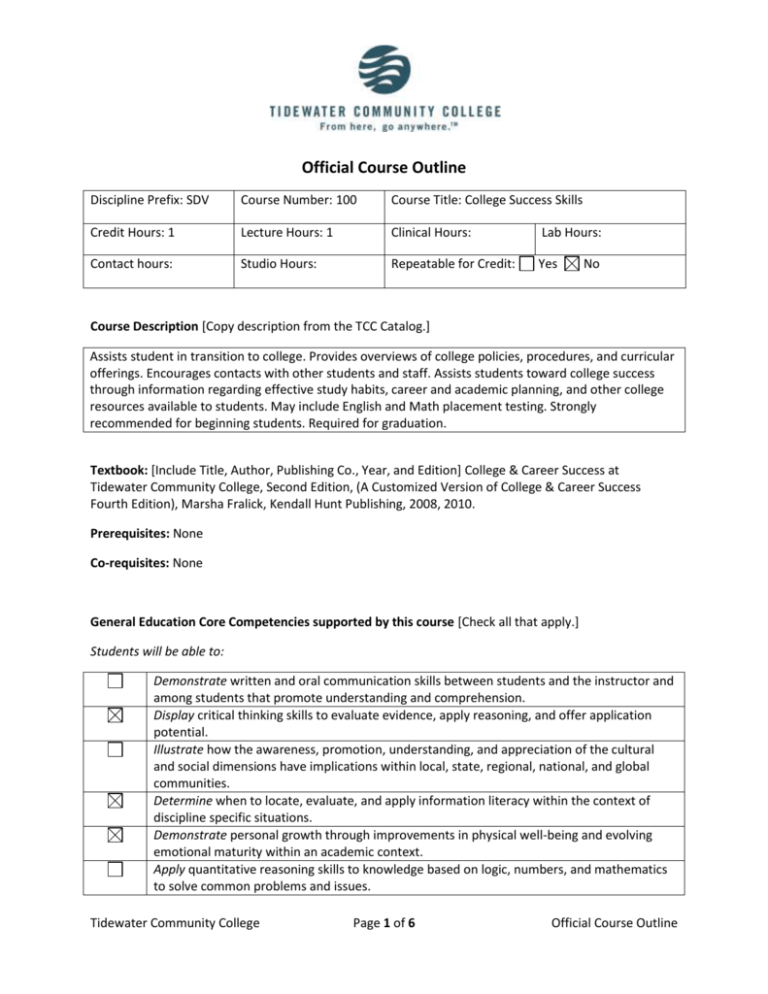
Official Course Outline Discipline Prefix: SDV Course Number: 100 Course Title: College Success Skills Credit Hours: 1 Lecture Hours: 1 Clinical Hours: Lab Hours: Contact hours: Studio Hours: Repeatable for Credit: Yes No Course Description [Copy description from the TCC Catalog.] Assists student in transition to college. Provides overviews of college policies, procedures, and curricular offerings. Encourages contacts with other students and staff. Assists students toward college success through information regarding effective study habits, career and academic planning, and other college resources available to students. May include English and Math placement testing. Strongly recommended for beginning students. Required for graduation. Textbook: [Include Title, Author, Publishing Co., Year, and Edition] College & Career Success at Tidewater Community College, Second Edition, (A Customized Version of College & Career Success Fourth Edition), Marsha Fralick, Kendall Hunt Publishing, 2008, 2010. Prerequisites: None Co-requisites: None General Education Core Competencies supported by this course [Check all that apply.] Students will be able to: Demonstrate written and oral communication skills between students and the instructor and among students that promote understanding and comprehension. Display critical thinking skills to evaluate evidence, apply reasoning, and offer application potential. Illustrate how the awareness, promotion, understanding, and appreciation of the cultural and social dimensions have implications within local, state, regional, national, and global communities. Determine when to locate, evaluate, and apply information literacy within the context of discipline specific situations. Demonstrate personal growth through improvements in physical well-being and evolving emotional maturity within an academic context. Apply quantitative reasoning skills to knowledge based on logic, numbers, and mathematics to solve common problems and issues. Tidewater Community College Page 1 of 6 Official Course Outline Demonstrate and apply scientific reasoning skills to the interpretation of empirical data to describe, predict, and manipulate natural phenomena. Measurable Learning Outcomes [Learning outcomes are specific, measurable objectives that describe what an individual will learn and be able to do as a result of completing a course. TCC will use A Faculty and Staff Guide to Creating Learning Outcomes to create measurable learning outcomes for all active courses. The Guide is produced by the National Resource Center for The First-Year Experience & Students in Transition, University of South Carolina. All faculty will be provided a Guide.] After the completion of this course, students will be able to: LEARNING OUTCOMES 1. Through the use of Virginia Education Wizard and other career assessments, students will articulate one to three potential careers based on their interests, values, and abilities. 2. Students will select or confirm their preferred program of study based on their career exploration. 3. Students will articulate the steps they need to take in order to achieve their career goals. 4. Students will demonstrate competence in using the Student Information System (SIS). 5. Students will activate their college email accounts. 6. Students will access Blackboard. 7. Students will identify and describe three to five offices / services that are available to them (e.g. counseling, disability services, financial aid, learning resource center, tutoring). 8. Students will identify three to five expectations of student civility/conduct as members of the college community. 9. Student will identify three examples of academic misconduct . 10. Students will identify at least two policies that affirm their rights as members of the college community (e.g. Family Educational Rights and Privacy Act (FERPA), Final Grade Appeal Procedure, Student Grievance Procedure). 11. Students will be able to distinguish between university parallel/transfer and applied programs. 12. Students will develop an academic plan, identifying all courses (including prerequisites) required to complete their desired curricular program. 13. Students will identify their preferred learning style. 14. Students will identify their optimal time, place, and setting for studying. 15. Students will identify their preferred method of note-taking. 16. Students will identify three to five strategies for test taking. 17. Students will identify three to five memory strategies. 18. Students will identify three to five strategies for managing reading. 19. Students will articulate the steps in developing and implementing personal goals. 20. Students will identify two to three strategies/tools for managing time. 21. Students will articulate three ways individuals are diverse and how diversity impacts society. 22. Students will identify three elements of effective communication (e.g. active listening, vebal and non-verbal messages.) 23. Students will identify two to three means of financing their higher education objectives (e.g. grants, scholarships, loans, military benefits, payment plans). 24. Students will develop a personal budget. 25. Student will identify three to five strategies for maintaining a healthy lifestyle. Tidewater Community College Page 2 of 6 Official Course Outline Topics Covered in this course [Briefly list the major content areas covered in this course. These topics should be related to the course’s measureable learning outcomes listed above. Delete and replace the text below. While listing major topics is expected, listing sub-topics is not required. Add content areas as needed.] MAJOR CONTENT AREAS 1. 2. 3. 4. 5. Career Exploration and Development College Resources and Policies Academic Planning Study Skills Life Management TOPICS CAREER EXPLORATION AND DEVELOPMENT 1. Career Exploration and Planning COLLEGE RESOURCES AND POLICIES 2. My TCC 3. Student Support Services 4. Student Rights & Responsibilities ACADEMIC PLANNING 5. Curricular Offerings and Academic Planning STUDY SKILLS 6. Learning Styles and Study Skills LIFE MANAGEMENT 7. Goal Setting 8. Time Management 9. Social Interaction and Diversity 10. Communications Skills 11. Financial Literacy 12. Wellness Methods of Assessment used in this course [Courses should assess student learning to ensure students are achieving the stated learning outcomes. Faculty can assess student learning in two ways: through direct and indirect assessments. Direct assessment measures student learning in a quantifiable way through tests, essays, and portfolios. Indirect assessment measures provide evidence of learning by gathering information other than student work output. Indirect assessment is used to provide evidence of learning by obtaining feedback from students or examining data that may be correlated with student learning. The following table provides examples of commonly used direct and indirect assessments. Place a check in the boxes that apply to the types of assessments used in this course. Tidewater Community College Page 3 of 6 Official Course Outline Tidewater Community College Page 4 of 6 Official Course Outline Direct Assessments Used Tests/Exams/Quizzes Essays Projects Studio/Lab Performance Research Report Oral Examination Demonstrations, presentations Lab Practical Portfolios Indirect Assessments Used Minute Papers Conferences w/students Mid-Semester Evaluations Questionnaires to gather feedback Course Exit Surveys Participation points awarded Other Assessments (please describe below) Journal Writings Check this box if standardized assessment instruments are used in this course. Check all that apply: Test required for certification or licensure: Standardized test within course for formative evaluation: Check this box if Common exam given to all sections of this course. Methods of Delivery [Check all that apply.] Face-to-Face Online Hybrid Required Course Materials (in addition to textbook): TCC Catalog TCC Student Handbook TCC Semester Schedule book Tidewater Community College Page 5 of 6 Official Course Outline Tidewater Community College provides programmatic and physical access for students with disabilities in a supportive learning environment, and in accordance with Section 504 of the Rehabilitation Act as amended, the Americans with Disabilities Act of 1990 as amended, and ξ 2.20-2012 of the Code of Virginia, as amended. All instructional materials will be provided in an accessible format to meet the academic accommodations for qualified students with disabilities. Signature: (Department Chair: Discipline/Program Head) Signature: (Lead Dean) Date Approved: Click here to enter a date. Date Last Reviewed: Click here to enter a date. Tidewater Community College Page 6 of 6 Official Course Outline
